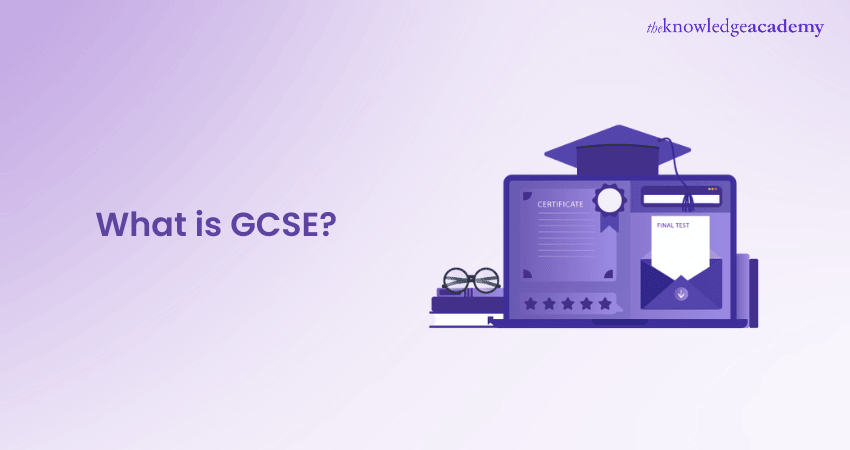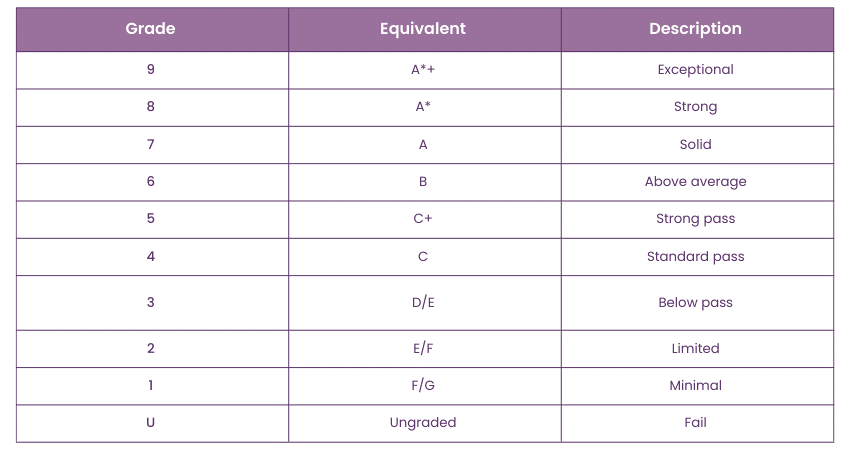We may not have the course you’re looking for. If you enquire or give us a call on 44 1344 203 999 and speak to our training experts, we may still be able to help with your training requirements.
We ensure quality, budget-alignment, and timely delivery by our expert instructors.

As you progress through secondary school, you’ll often hear about GCSEs and their importance. But What is GCSE, and why does it matter so much? General Certificates of Secondary Education (GCSEs) are key qualifications taken in the UK. They form the foundation for your next steps, whether that’s further education or starting a career. In this blog, we’ll break down what GCSEs are, their significance, how they’re graded, and how to choose the right subjects to shape your future. So, let’s get started!
Table of Contents
1) What is GCSE?
2) The Importance of GCSEs
3) How are GCSEs Graded?
4) What Are the Mandatory Subjects in GCSEs?
5) How to Choose Your GCSE Subjects?
6) Can You Take GCSE Exams on Your Own?
7) Potential Pathways After GCSEs
8) How GCSEs Are Assessed?
9) What GCSEs Can Lead To?
10) When Were GCSEs Introduced?
11) Do Universities Look at GCSE or A Levels?
12) Conclusion
What is GCSE?
GCSE stands for General Certificate of Secondary Education. It's qualification students typically earn at the end of their secondary school education, around the age of 16, in the UK.
GCSEs are a set of exams taken in various subjects to show your knowledge and skills in those areas. These qualifications are essential for progressing to higher education or entering the workforce.
The Importance of GCSEs
GCSEs are very important as they lay the foundation for your future education and career. They are often the first major qualifications you'll earn and are crucial for getting into further education, like A-levels or vocational courses. With various GCSE options available, you can tailor your path according to your interests and career goals. Employers and universities also consider your GCSE results when evaluating you for jobs or admission.
How are GCSEs Graded?
GCSEs are graded on a 9 to 1 scale, where 9 represents the highest grade and 1 the lowest. The new grading system now uses numbers instead of the old letter grades, providing a more precise assessment of student performance. Here’s how the new grades correspond to the old ones:

a) Grade 9 – Even higher than the old A*, indicating exceptional performance.
b) Grade 8 – Below an A* but above an A, reflecting a strong understanding of the subject.
c) Grade 7 – Slightly below an A but still very close, showing solid achievement.
d) Grade 6 – Slightly better than a B, demonstrating above-average knowledge.
e) Grade 5 – Below a B but above a C, also known as a 'strong pass'.
f) Grade 4 – Equivalent to a C, referred to as a 'standard pass'.
g) Grade 3 – Below a D but above an E, showing some understanding but not quite passing.
h) Grade 2 – Between an E and an F, indicating a limited grasp of the material.
i) Grade 1 – Between an F and a G, representing minimal achievement.
j) Ungraded (U) – The lowest possible mark, and just like the old system, a U represents a fail.
What are the Mandatory Subjects in GCSEs?
Some subjects are mandatory for all students taking GCSEs. These usually include English, Mathematics, and Science. You may also be required to study subjects like Physical Education and Religious Studies, depending on your school.
Learn essential techniques for prioritising tasks with our Time Management Training – Join today!
How to Choose Your GCSE Subjects?
Here are some tips to help you decide the best GCSE subject options for your future.
Required Number of GCSEs
You should take a minimum of 5 subjects, and while it's possible to take up to 16 GCSEs, managing such a large number can be extremely challenging. Most students typically take around 9 GCSE subjects.
Select Subjects You Excel In
Choose subjects you are good at and enjoy. Doing well in these subjects will boost your overall grades and confidence.
Most Challenging GCSE Subjects
Some subjects are considered more challenging than others, like
a) Physics
b) English Literature
c) Maths
d) Computer Science
e) Economics
f) Biology
g) English Language
Think about whether you enjoy a challenge and are prepared to put in the extra effort.
Avoid Overloading with Too Many Subjects
Taking too many subjects can be overwhelming. It's better to focus on doing well in a manageable number of subjects than spreading yourself too thin.
Seek Advice from Others
Consult your teachers, parents or career advisors when choosing your subject. They can be useful and give you the information to make the right choices.
Easiest GCSE Subjects
While it's important to choose subjects you enjoy and are good at, some subjects are generally considered easier, like
a) Geography
b) Film Studies
c) Religious Studies
d) Media Studies
e) Hospitality and Catering
f) Business Studies
g) Drama
h) Physical Education
However, make sure they align with your interests and future goals.
Consider Your Future Goals and Career Aspirations
Think about what you want to do after school. If you have a specific career in mind, choose subjects that will help you get there. For example, if you want to be a doctor, focus on science subjects.
Learn how to deal with stress with our Stress Management Course – Join today!
Can You Take GCSE Exams on Your Own?
Yes, it is possible to sit for GCSE as a private candidate. This means you study the material on your own or with a tutor and then take the exam at an authorised exam centre. This option is normally preferred by learners who were unable to pursue GCSEs in school or even those who wish to repeat exams to improve their grades.
Potential Pathways After GCSEs
After completing your GCSEs, you have several options. You can continue your education by taking Advanced Level qualifications (A-levels), Business and Technology Education Council Qualifications (BTECs), or other vocational qualifications, with many universities now focusing on digitising universities to offer more flexible learning opportunities. Alternatively, you can start an apprenticeship or enter the workforce, or explore what to do after GCSEs based on your career goals.
How GCSEs Are Assessed?
GCSEs are assessed through a mix of exams and coursework. Most subjects have written exams at the end of the course, but some may include practical work, projects, or speaking tests, depending on the subject. Your grades are based on how well you perform in these assessments. Some subjects may also have multiple exam papers to cover different topics.
What GCSEs Can Lead To?
GCSEs are an important step for your future. They can help you move on to A Levels, vocational courses, or apprenticeships. Your GCSE results can also help you get your first job or choose a career path. Employers often use GCSE grades to check your skills, especially in Maths and English. Strong GCSE results can also make your university applications more competitive.
When Were GCSEs Introduced?
GCSEs were introduced in 1988 in the UK. They replaced the older O-Levels and CSE qualifications to create one system for all students. This change was made to make education more accessible and fairer for everyone. Since then, GCSEs have undergone updates to improve their quality and make them more challenging.
Do Universities Look at GCSE or A Levels?
Universities look at both GCSE and A Level results. GCSE grades are often used to check if you meet basic requirements, like passing in English and Maths. However, A Levels are more important because they show how well you've done in the subjects you want to study further. Some university courses may have specific GCSE grade requirements. For example, careers in medicine or engineering may require high grades in Science or Maths at GCSE level.
Conclusion
GCSEs are a crucial step in your education, helping to shape your future. Having an understanding of “What is GCSE” and selecting the most appropriate subjects, as well as doing well in your exams, prepares you well for the next level of education and your desired job market. However, do not rush with decision-making; consult with others and follow the path that will allow you to leverage your skills and achieve your goals.
Learn the career development challenges with our Career Development Course – Sign up today!
Frequently Asked Questions
Can You Do an Access Course Without GCSEs?

Access to Higher Education Diplomas is a fast and popular way to qualify for university. They are equivalent to A Levels and usually take 9-12 months to complete. You don’t need GCSEs to start an Access to Higher Education Diploma, but most universities will require Maths and English qualifications when you apply.
Can I Apply for University Courses Without GCSE Grades?

Traditionally, universities required specific GCSE and A Level grades for their courses, often matching the subject you wanted to study. Now, the system is more flexible. Many universities are less strict about which GCSEs you have, though Maths and English are still the most commonly required. If you need these qualifications quickly.
What are the Other Resources and Offers Provided by The Knowledge Academy?

The Knowledge Academy takes global learning to new heights, offering over 3,000 online courses across 490+ locations in 190+ countries. This expansive reach ensures accessibility and convenience for learners worldwide.
Alongside our diverse Online Course Catalogue, encompassing 19 major categories, we go the extra mile by providing a plethora of free educational Online Resources like News updates, Blogs, videos, webinars, and interview questions. Tailoring learning experiences further, professionals can maximise value with customisable Course Bundles of TKA.
What is The Knowledge Pass, and How Does it Work?

The Knowledge Academy’s Knowledge Pass, a prepaid voucher, adds another layer of flexibility, allowing course bookings over a 12-month period. Join us on a journey where education knows no bounds.
What are Related Courses and Blogs Provided by The Knowledge Academy?

The Knowledge Academy offers various Personal Development Courses, including the Career Development Course, Stress Management Course, and Time Management Training. These courses cater to different skill levels, providing comprehensive insights into GCSE Grades 2025.
Our Business Skills Blogs cover a range of topics related to Career Development, offering valuable resources, best practices, and industry insights. Whether you are a beginner or looking to advance your Career Development knowledge, The Knowledge Academy's diverse courses and informative blogs have got you covered.
Upcoming Business Skills Resources Batches & Dates
Date
 Career Development Course
Career Development Course
Fri 23rd May 2025
Fri 4th Jul 2025
Fri 5th Sep 2025
Fri 24th Oct 2025
Fri 9th Jan 2026
Fri 6th Mar 2026
Fri 1st May 2026
Fri 3rd Jul 2026
Fri 4th Dec 2026






 Top Rated Course
Top Rated Course



 If you wish to make any changes to your course, please
If you wish to make any changes to your course, please


